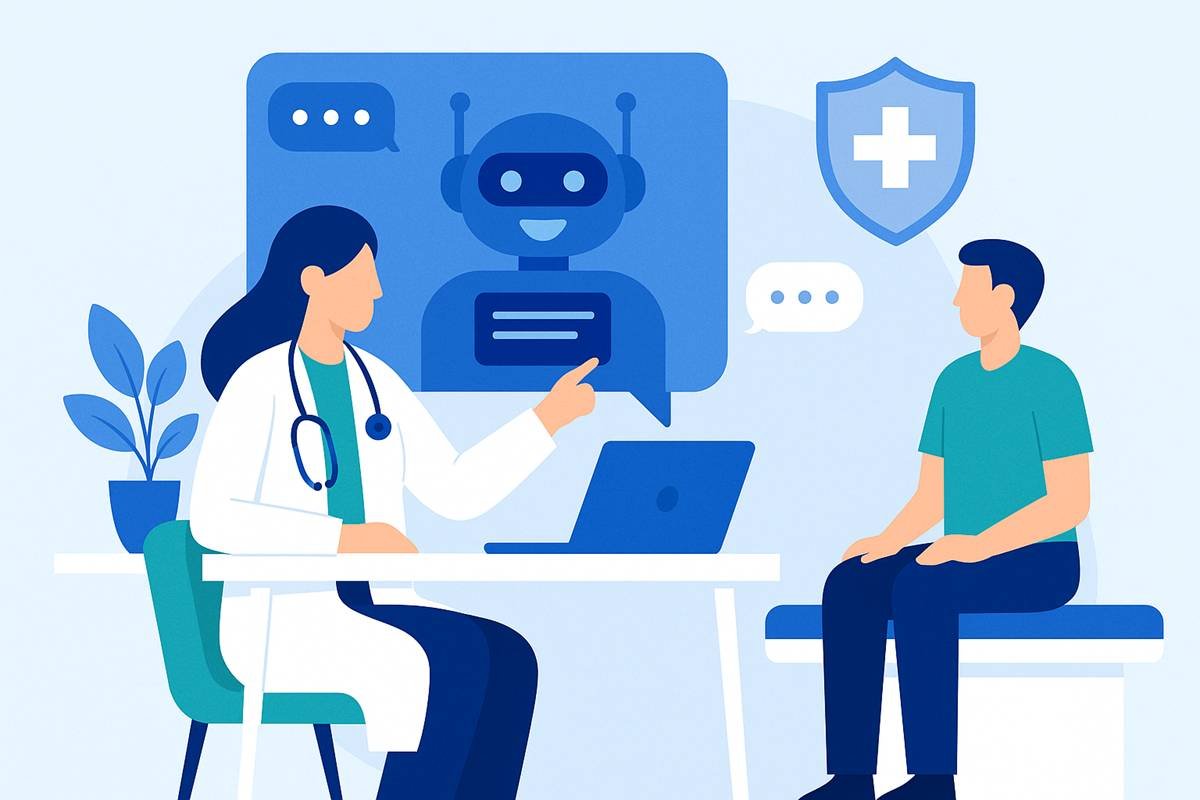Over the last few years, healthcare systems have observed a massive outbreak of digital conversion around the globe. One of the technological advances behind this is the advent and implementation of AI-driven chatbots that have been a game changer in the level of patient support and the medical experience in general. By facilitating real-time communication and 24/7 support, AI chatbots are changing the way patients communicate with doctors.
What Is AI Chatbots in Healthcare?
AI chatbots are virtual hosts that replicate human conversation with the help of natural language processing (NLP), machine learning and real-time data integration. For care, such bots are often designed to help with frequently asked questions from patients, scheduling appointments, and even checking symptoms, medication reminders, and mental health support.
AI chatbots are known to work 24/7 unlike the typical systems where they should be operated manually by a human to know who is reaching out to you and give them an instant answer or callback.
AI Chatbots in Patient Support Majors Benefits:
1. 24/7 Availability
The first big advantage of AI chatbots is their 24/7 continuity. No longer do patients have to wait for office hours to ask questions or schedule appointments. This immediate availability improves patient satisfaction and makes sure that urgent issues are recognized on-the-fly.
2. More Efficient and Immediate Communication
Instant Response to Patient Inquiries AI chatbots provide instant response times to patient inquiries, minimizing time on hold and waiting for email replies. Whether to review lab results, gather details about a condition or confirm a prescription refill, chatbots provide information rapidly and accurately.
3. Better Appointment Scheduling
Patients can schedule, reschedule or cancel appointments through chatbots when they wish. AI bots could also remind and alert patients to go for follow-ups, curbing no-shows and improving clinic productivity.
4. Symptom Checking and Triage
Most AI chatbots come with a medical database that allows users to look up symptoms and gain at least a first impression of what they might have. While the bots don’t replace doctors, they can help patients figure out the urgency of their symptoms and whether they need to seek urgent care or schedule an appointment for a future date.
5. Reminders for Medication and Therapies
Compliance with recommended treatment regimens by patients is a ubiquitous problem in medical practice. Chatbots can offer dose reminders, monitor dosages and send educational information to keep patients engaged with their treatment — all while ensuring better health outcomes.
6. Emotional Strengthening And Mental Health
AI-powered chatbots are becoming more widely used to help with mental health. Bots like Woebot or Wysa provide conversational therapy, meditation exercises and emotional support to help patients navigate anxiety, depression and stress in a way that’s private and judgment-free.
The Personalized Patient Journey
AI chatbots are more than just reactive tools—they are proactive in making the patient experience more personal. By linking to Electronic Health Records (EHR) and patient history, chatbots can customize responses for specific personal medical backgrounds, preferences and past interactions. This personalized approach makes patients feel listened to, cared for, and supported.
For example, a user with diabetes could be provided with nutritional advice or bumped with information on their condition. “Also, a patient who is recovering from surgery could receive daily postoperative recovery check-ins or pain management recommendations via interfacing with a chatbot.
Maintenance of Low Man-hours of Employees and Low Running Costs
AI chatbots take the administrative load off medical personnel. Working on appointments and regular queries reduces doctor time spent on non-emergent or simpler cases. Staff productivity is increased, which also lowers the costs of doing business by eliminating the requirement for a large support staff.
Real-Life Use Cases of AI Chatbots in Healthcare
- Babylon Health (UK): Provides AI-driven consultations that take into account personal medical history and also common medical knowledge.
- Florence: A health assistant chatbot that reminds people to take medicine, tracks health metrics, and locates nearby pharmacies.
- Buoy Health: Offers symptom checking and advises on the best next steps, whether for self-care or seeing a specialist.
They have demonstrated efficacy in lowering patient waiting times, self-management, and better interaction with healthcare organizations.
Privacy and Ethical Considerations
Privacy and data security are essential when considering any digital tool in health care. AI chatbots need to adhere to healthcare regulations such as HIPAA in the US or GDPR in Europe. It’s critical to build trust and protect sensitive health data by ensuring end-to-end encryption, securing data and ensuring educated patient consent.
In addition to morality, developers must ensure that/the bots are not misleading or biased. Periodic audits, updating, and human intervention are required to prevent systematic bias in AI responses.
The future of AI chatbots in healthcare
The possibilities of AI chatbots are growing in leaps and bounds. Future features might include voice-driven bots, multilingual support, support for wearables, and even AI-powered diagnostics with real humans on the receiving end.
With the ongoing reform of health systems, AI chatbots will drive technology-enabled, patient-centred care models. They will not replace providers’ human touch, but they will accompany it to help ensure that people get the right information and support at the right time and with the right amount of empathy along their healthcare journey.
Final Thoughts
The future of healthcare: AI chatbots AI chatbots are revolutionizing patient support, democratizing healthcare and making it more personalized. Whether guiding through scheduling appointments or providing emotional support in the middle of the night, these smart tools are transforming the total patient experience.
Key Takeaway: For healthcare providers who want to enhance the quality of services and patient involvement, leveraging Chatbot AI technology is not just a choice or an option; it’s becoming a part of modern digital era needs.
Feel free to contact BrandingX for your Business Branding Services and SEO Services in Ahmedabad.

